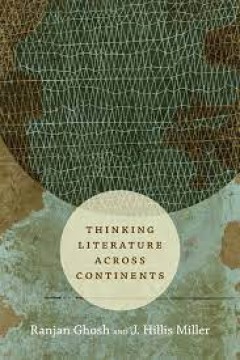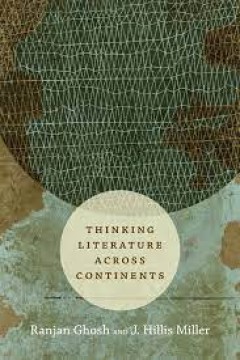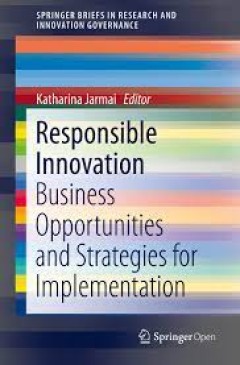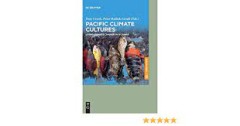Filter by

John Gardner: A Tiny Eulogy
John Gardner’s career was permanently changed by his publication of On Moral Fiction (1978), a controversial and derided assessment of the state of literature as Gardner saw it. By arguing for a return to greater seriousness and moral commitments in literature, Gardner found himself attacked on all sides by critics and writers who found his conservatism suspicious or simply irrelevant. In thi…
- Edition
- -
- ISBN/ISSN
- 9780615734514
- Collation
- -
- Series Title
- -
- Call Number
- -

Thinking Literature across Continents
'Thinking Literature across Continents' finds Ranjan Ghosh and J. Hillis Miller—two thinkers from different continents, cultures, training, and critical perspectives—debating and reflecting upon what literature is and why it matters. Ghosh and Miller do not attempt to formulate a joint theory of literature; rather, they allow their different backgrounds and lively disagreements to stimulate…
- Edition
- -
- ISBN/ISSN
- 9780822373698
- Collation
- -
- Series Title
- -
- Call Number
- -

The Golden Rule in Sports
Elite level sport lends itself to a highly competitive environment that encourages players to seek a competitive advantage in order to win. Since competition is an inherent condition that is also considered desirable in this setting, it may at first glance seem as if cooperation does not have any room in elite level sports. Sustainable cooperation can be mutually advantageous for players, but i…
- Edition
- 1
- ISBN/ISSN
- 978-3-658-07028-1
- Collation
- XVI, 189, 17 b/w illustrations
- Series Title
- -
- Call Number
- -

A Critical Examination of Ethics in Health Care and Biomedical Research: Voic…
This book is a critical examination of certain basic issues and themes crucial to understanding how ethics currently interfaces with health care and biomedical research. Beginning with an overview of the field, it proceeds through a delineation of such key notions as trust and uncertainty, dialogue involving talk and listening, the vulnerability of the patient against the asymmetric power of th…
- Edition
- Ed. 1
- ISBN/ISSN
- 978-3-319-18332-9
- Collation
- -
- Series Title
- International Library of Ethics, Law, and the New Medicine
- Call Number
- 301 ZAN c

The Fallacy of Corporate Moral Agency
It is uncontroversial that corporations are legal agents that can be held legally responsible, but can corporations also be moral agents that are morally responsible? Part one of this book explicates the most prominent theories of corporate moral agency and provides a detailed debunking of why corporate moral agency is a fallacy. This implies that talk of corporate moral responsibilities, beyon…
- Edition
- 1
- ISBN/ISSN
- 978-94-017-9756-6
- Collation
- XIV, 218, 7 b/w illustrations
- Series Title
- Issues in Business Ethics
- Call Number
- -

The Ethics of Energy Sustainability
This book is an easy to use instructional aide. Explore sustainability issues in contemporary society through a transdisciplinary approach. Chapters include ethics, public resources, public policy, combustion, heat exchangers, nuclear, solar, water, and wind energy. A short summary is presented for each topic, followed by additional topics for research, assignments, and references. The complex …
- Edition
- 1
- ISBN/ISSN
- 978-94-017-9701-6
- Collation
- XIII, 71, 10 b/w illustrations, 2 illustrations in colour
- Series Title
- -
- Call Number
- -

The Ethics of Cultural Heritage
It is widely acknowledged that all archaeological research is embedded within cultural, political and economic contexts, and that all archaeological research falls under the heading ‘heritage’. Most archaeologists now work in museums and other cultural institutions, government agencies, non-government organisations and private sector companies, and this diversity ensures that debates contin…
- Edition
- 1
- ISBN/ISSN
- 978-1-4939-1649-8
- Collation
- XVII, 219, 21 illustrations in colour
- Series Title
- Ethical Archaeologies: The Politics of Social Justice
- Call Number
- -

Thinking Literature across Continents
'Thinking Literature across Continents' finds Ranjan Ghosh and J. Hillis Miller—two thinkers from different continents, cultures, training, and critical perspectives—debating and reflecting upon what literature is and why it matters. Ghosh and Miller do not attempt to formulate a joint theory of literature; rather, they allow their different backgrounds and lively disagreements to stimulate…
- Edition
- -
- ISBN/ISSN
- 9780822373698
- Collation
- -
- Series Title
- -
- Call Number
- -

Responsible Innovation Business Opportunities and Strategies for Implementation
This Open Access book, Responsible innovation provides benefits for society, for instance more sustainable products, more engagement with consumers and less anxiety about emerging technologies. As a governance tool it is mostly driven by research funders, including the European Commission, under the term “responsible research and innovation” (RRI). To achieve uptake in private industry is a…
- Edition
- -
- ISBN/ISSN
- -
- Collation
- -
- Series Title
- -
- Call Number
- -

Pacific Climate Cultures Living Climate Change in Oceania
This edited volume examines the opportunities to think, do, and/or create jointly afforded by digital storytelling. The contributors discuss digital storytelling in the context of educational programs, teaching anthropology, and ethnographic research involving a variety of populations and subjects that will appeal to researchers and practitioners engaged with qualitative methods and pedagogies …
- Edition
- -
- ISBN/ISSN
- 9783110591415
- Collation
- -
- Series Title
- -
- Call Number
- -
 Computer Science, Information & General Works
Computer Science, Information & General Works  Philosophy & Psychology
Philosophy & Psychology  Religion
Religion  Social Sciences
Social Sciences  Language
Language  Pure Science
Pure Science  Applied Sciences
Applied Sciences  Art & Recreation
Art & Recreation  Literature
Literature  History & Geography
History & Geography